#Jewish custom
Note
re: your comment about the misinterpretation and misuse of "tikkun olam" by non-Jews, could you please explain what it *does* mean? I've heard that it roughly translates to repairing the world (like with Rabbi Tarfon's "it is not your duty to finish the work, but neither are you at liberty to neglect it"), but idk if that's what it actually is or not (sorry if any phrasing is weird, i've been awake for way too long today)
Your understanding is correct.
It does mean repairing the world. This means doing charity and choosing kindness whenever possible and generally doing small and large things without recognition in order to leave the world better than you found it. Plant a tree. Read at a nursing home. Save all your loose change for ten years then donate that amount to a cause you care about. Make kindness that helps others heal a part of your daily practice. This is tikkun olam.
I have seen bigots who consider themselves progressive try to goysplain tikkun olam as Jews attempting to impose their idea of perfection on the world around them and that we use it to justify violence. I have seen people say that Jews consider the bombing of Gaza and Rafah to be the ideal practice of tikkun olam. And it is a blatantly and horrifically false and disingenuous to say this. Tikkun olam is my absolute favorite aspect of my faith. I wake up and choose kindness and peace every single day and have since I learned about this concept. It is not always easy, but it is always worth it.
And to see others pervert it into something violent and to associate that violence as synonymous with Jewish religious ideology is truly one of the most painful things I’ve experienced in this conflict and one of the most bigoted things I’ve experienced in my life.
655 notes
·
View notes
Text
Menachem Bluming Muses: Gezuntheit!
The ‘bless you’ response to a sneeze was enacted by one of the popes during the bubonic plague. So it definitely has a non-Jewish whiff about it.
But long before that, Jews blessed each other upon sneezing. The Talmud records that in the earlier generations, people didn't get sick before they died. They simply sneezed and their souls left their bodies. So it was customary to wish a sneezer "To Life!" for fear that their sneeze was a herald of death.
Things changed in the times of our forefather Jacob. He prayed that one should rather get sick some time before dying, in order to have a little warning and time to prepare for leaving this world. His request was granted, and so sneezing alone was no longer a sure sign of impending death. But it still could be a symptom of illness, so the custom arose to wish a sneezer good health - Assuta in Aramaic, Tzu gezunt in Yiddish, or Labriyut in Hebrew.
Interestingly, one source says that after being blessed with health, the sneezer himself should respond to the one who blessed him "Bless you!" (Baruch tihyeh in Hebrew). Another interesting note: the sages taught that one does not respond to a sneeze while in the middle of studying Torah. Torah study is too holy to be interrupted, and anyway its power will protect the sneezer from harm.
Indeed these days most people survive a sneeze without any major consequences. But that doesn't mean we should no longer wish each other good health. Words have power. The more we bless each other the better. A sneeze is as good an excuse as any to bless someone.
Mendel (Menachem) Bluming
Sources:
Talmud Bava Metzia 87a, Brochos 24b
Pirke D'Rebbi Eliezer 52
Shulchan Aruch Yoreh Deah 241:17 etc
0 notes
Text
If you looked in TK’s camera roll, you’d be sure to see-
12 pictures of stranger’s dogs
11 “keep going” mantras from Cooper
10 pictures of Buttercup
9 of Carlos cooking
8 of Carlos doing yoga
7 sensational selfies
6 game night victories
5 unhinged memes
4 saved recipes
3 Mateo close ups
2 FaceTime screenshots
And an article about leaving the bag in your teaaaa 🎶
#911 lone star#tk strand#inspired by the post of TK’s sad camera roll from the carlos is kidnapped episode#like could they have put in any effort at all#as to this do not ask what it is i do not know lol#in theory it would be to the tune of the 12 days of christmas but tk is jewish and is that weird#but i came up with this in my head last night when i hadn’t eaten for five hours because i was told to take my lunch break#an hour and a half into my shift because of how short staffed we are#so this helped me not cry in front of customers lol#sorry for complaining i need to shut up lol
58 notes
·
View notes
Text
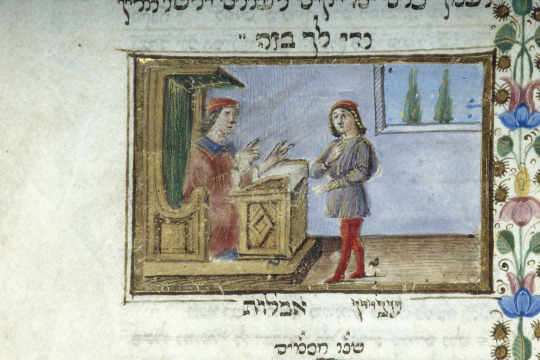
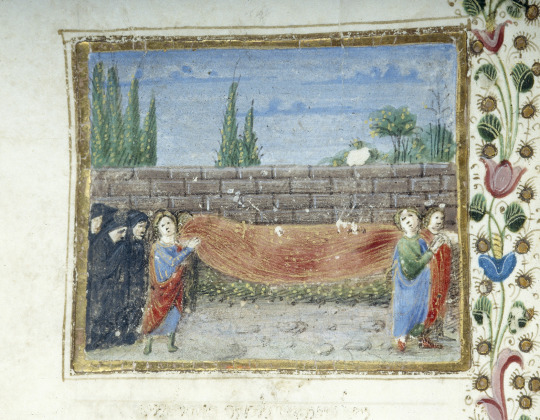
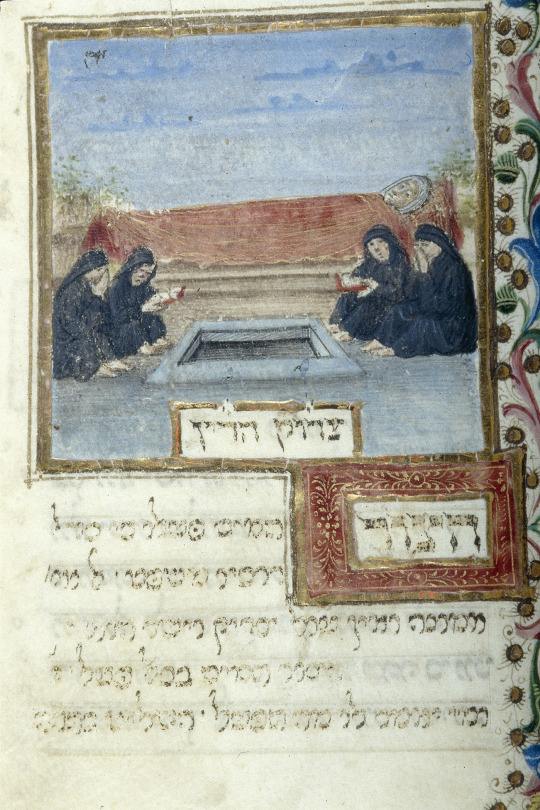
1. Instructions in Mourning Customs
2. Funeral Procession
3. Burial
Manuscript made ca. 1450 - 1500, currently in Princeton University Library.
#manuscript#illustration#funeral services#burial#jewish#customs#history#15th century#gothic#tempera painting#judaism
15 notes
·
View notes
Text
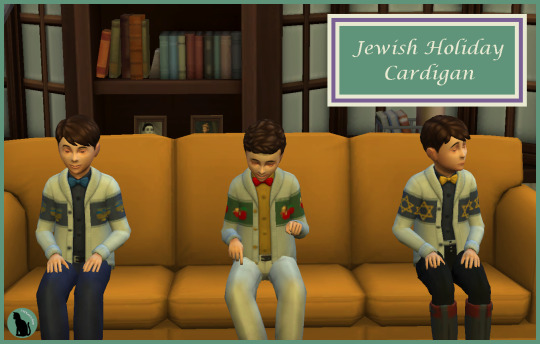
Do your little Jewish sim boys need itchy cardigans to be shoved into for holiday events? Then these are for you!
I thought it sad that the Seasons cardigan had Christmas Tree cardigans but nothing for Hanukkah or Rosh Hashanah, so I decided to try my hand at a few extra swatches. Although the Star of David and Menorah cardigans repeat the pattern all the way around, the Apples and Honey cardigan reads "שנה טובה."
Shanah tovah to you and yours these High Holidays.
Requires Seasons. Made for Child sims.
Download from SimFileShare here.
Made with S4S.
#sims 4#simblr#sims#the sims 4#ts4#my cc#sims 4 cc#ccsaturday#ts4cc#ts4 seasons recolor#ts4 recolor#ts4 custom content#ts4 seasons#jewish sims#jewish sims cc#jewish cc#sims hanukkah#sims rosh hashanah
40 notes
·
View notes
Text
Sfira begins and with it my acapella playlist. Naturally my tendency to relisten to the same song on repeat has gone into full force too.
#jumblr#jewish joy#my custom is to not listen to recorded music as well as live#acapella is fine#and is my life saver
9 notes
·
View notes
Text
I'm back. It only took three messages to Tumblr customer support over the past week. They apologized for terminating my account. I was told it was a mistake. But I'm back and I'm as Jewish, Zionist, and jazz-loving as ever.
15 notes
·
View notes
Note
Howdy! Conversion student here. I was inspired by your posts to look up Nittel Nacht since I had not heard about it before, and I was curious to know how commonly it's observed in your experience. Has it always been part of your practice? Love your blog!
Nittel Nacht is a term given to Christmas Eve dating back to at least the 17th century in Eastern Europe. Jews who observe Nittel Nacht refrain from studying Torah and stay at home, instead playing board games like chess. There are both mystical and practical reasons for this:
-Learning Torah is said to elevate the spirit of the deceased. Because Christmas celebrates Jesus, we do not want to elevate his spirit with our Torah learning.
-Christmas Eve, and any Christian holiday, has historically been a time of increased antisemitic violence. It was safer for Jews to be at home with their family than at the Beit Midrash being visibly Jewish.
Today, Nittel Nacht is mainly only observed by Chassidic communities, as Chassidic communities tend to hold on to more traditional practices and because the Baal Shem Tov encouraged observance of Nittel Nacht.
I grew up in a Chassidic family, and thus grew up observing Nittel Nacht. I still observe it because I believe it is important for us to never forget the pain and terror associated with Christmas and our endurance as a people.
112 notes
·
View notes
Text
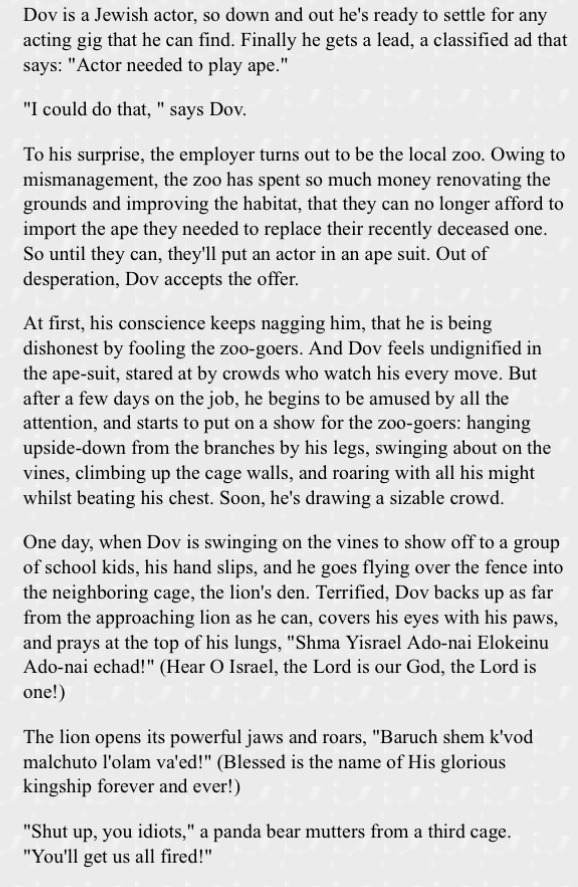
This sinophobic nonsense with the fake sun bear is the exact premise of a really old Jewish joke. The idea that anyone’s supposed to take this seriously…..
#context: it is a common custom for Jews to recite the Shema when our death is imminent#Jewish#lucky charms
41 notes
·
View notes
Text
Chapter One of Aimez-vous les uns les autres (Love One Another) posted today, sequel to Far Away from Temple After Sunset
Summary: It’s Christmas Eve and the first night of Hanukkah when Newt and Tina are injured in an action against Grindelwald, whereafter they are evacuated with Theseus & co. by the Magical Resistance to a small church in rural France. Dealing with curse-exhaustion, landmine injuries, and travel through Nazi- and Grindelwald-occupied regions isn’t how either of them expected to spend the holidays, but—-in the big scheme of things—-there were, arguably, worse ways to finish 1940… In the end, the experience brings them closer together and—-back in England—-holidays with their families give them paradoxical hope for shared peace in the years to come. (Written for @afrenchaugurey!)

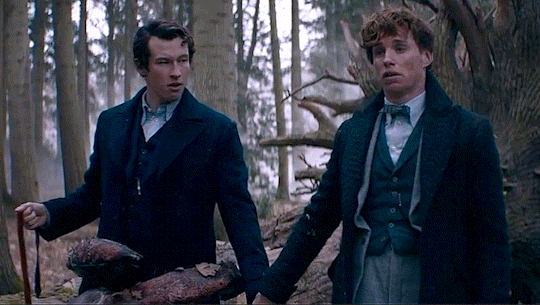
Excerpt (opening scene):
Newt had woken up in an extraordinary number of incredibly strange places in his life, but—for him—coming to on top of a hay bale in the back of a Muggle lorry was really maybe the strangest.
In fact, if he weren’t so groggy, he certainly would have done more than a double-take to find his injured leg elevated on the thighs of what appeared to be an actual Christian pastor, sitting on the haystack directly beside him. Newt moved his arm to scratch at his nose then, only to fuzzily realise he’d been warmly tucked into what was definitely said pastor’s clerical robes, so he ultimately only succeeded in hitting himself in the face with its massive sleeves...
The pastor had looked up at him by then to offer a smile, but Newt’s mind still wasn’t up to its normal speed—though his heart felt like it was pounding doubletime—so he broke the gaze as fast as he could, casting about for his brother, who must have heard the shift of his head because—
“Merlin’s beard!” — A voice from across and behind him in the truck, and then Theseus had knelt on the dusty boards beside him, fingers instantly feeling at his wrist and neck for pulse and pressure, before pulling back to balance on his haunches, brows furrowed. “You are drugged to the gills, little brother... How in Gamp’s good name are you awake?” [1]
As the truck bounced over a particularly deep pothole, Newt couldn’t help throwing the robe’s sleeve over his eyes to hide his discomfort. Beside him, he could hear Theseus saved from falling on his rump thanks to the soft thump of one of the maquisards’ boots at his back.
“Humans don’t have gills,” he finally murmured through gritted teeth. “And to answer your question, I’ve developed a rather unfortunate resistance to a number of common substances, that’s why I’m awake…” A beat and a frown. “Where’s Tina?”
“You’re on her, Newt.”
He uncovered his face, tilting his head back to see what he was pillowed on, only to be met with the gentle dip at the top of his wife’s thighs; the scratch of her warm, wool coat; the subtle scent of her perfume that always reminded him of camping for pleasure (not work) in Puzzlewood Forest… [2]
He twisted back further for a better look (and he caught a glimpse of her, too—head low and pillowed on Auror Voorhees’ shoulder, deeply asleep), but Theseus put a hand on his chest to urge him back down before he could better assess her.
“Stop moving. Macmillan’s stability spells on your leg are already being tested by these roads...”
Newt relaxed reluctantly into the dry hay, and Theseus thoughtfully transfigured a handkerchief into a towel to tuck beneath his neck when he noticed him grimace at the texture.
“Look,” he reassured, “she’s fine — just utterly exhausted. She’ll be good as new with a few cautionary countercurses and a couple days’ rest. And we hope to be able to say the same for you soon.”
“So - where are we going then?” Newt countered with quiet acceptance, glancing from the pastor to Theseus and back again. “And - and what is he doing here?”
“Don’t worry,” Theseus reassured glibly. “He’s a squib.”
#need to do a tiny bit of editing for geographic and magical clarity but it’s here for now!#my stuff#tina goldstein#newt scamander#Theseus scamander#shameless hurt/comfort#holiday fic#jewish tina goldstein#autistic newt scamander#fantastic beasts fanfic#scamander brothers#chapter 1 of 4#I write the scamanders as largely non-religious bc it’s easier for me bc that’s how I was raised so this has been a fun fic#to learn more about certain cultures - customs - history etc!!#fantastic beasts and where to find them
12 notes
·
View notes
Text
As per the last post's tags: stuff I got / am getting from my family

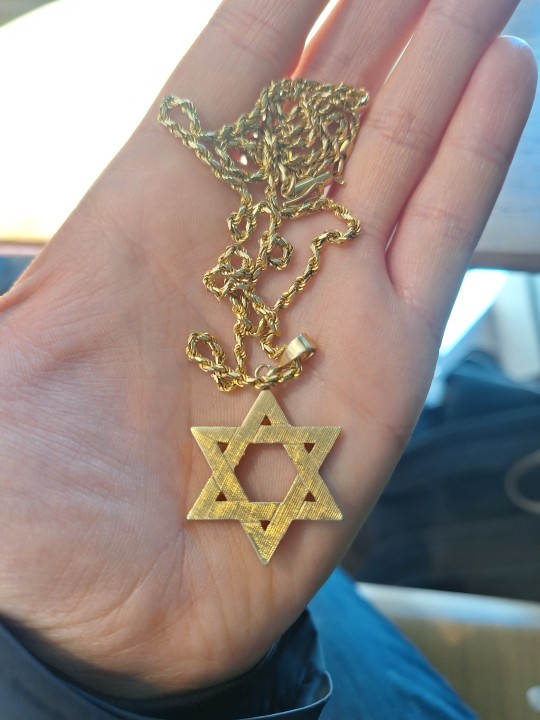
My grandma gave me this heirloom the other day. 14k gold. I don't really intend to wear it, but it's so pretty & I wanna have it hung up in my room maybe. It'd be a shame for it to live in a bag all its life.

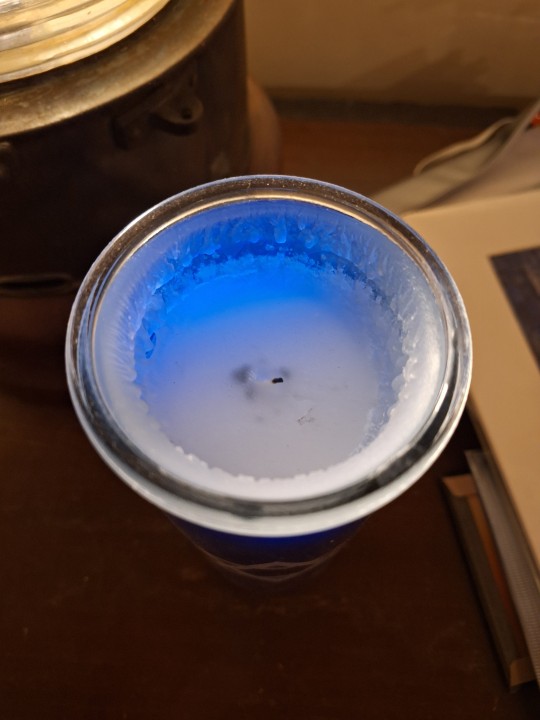
Found this candle yesterday at my dad's place & I can't take it Yet (bc we're not allowed to take anything of potential worth from the estate until probate is settled) but my sister said I could have it. So. 🥺
#speculation nation#it's that kind of thing of like. even though i wasnt raised jewish it's still been such a big part of my life and family#i want to keep these things. i wanna try learning more about judaism. at least Some.#i dont want my only true experiences with religious customs to be like. funerals :/#like with my grandpa and his jewish funeral a few years ago.#my jewish grandma is still alive and likely will be for a while. her mom only died last year.#WE'LL HOPE (pls pls pls let me not lose another family member so soon)#but yeah. Things. i like having them.
10 notes
·
View notes
Text

Anna Binkuńska (1908–1997) "Żydowskie wesele”
Autorka przykleiła kartkę z opisem jego treści:
"Żydowskie wesele. Państwo młodzi siedzą z rodziną ze starszymi. Młodzież bawi się w innym mieszkaniu. Wódka nie stoi na stole ani wino. Nalewa się gościom trochę do szklanek lub kieliszków. Żydzi tańczą oddzielnie starsi. Pochylają się, przysiadają, nie udało mi się tego odtworzyć. Żydówki tańczą starsze taniec z chałkami, podrzuca jedna z nich te chałki w górę, inna łapie i później ona podrzuca. Wreszcie kroi się na kromki i zjada z faszerowaną rybą lub z galaretką z nóg wołowych. Czasem bywa też rosół na weselu."
Źródło: Muzeum Etnograficzne we Wrocławiu/Ethnographic Museum in Wrocław
✍️ Joanna Kurbiel, Dział Sztuki ME @folkmania
6 notes
·
View notes
Text
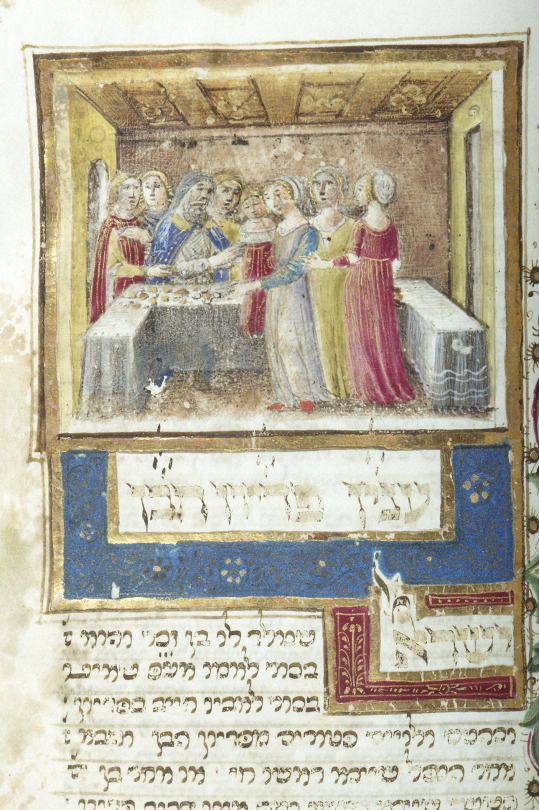
Pidyan HaBen (Redemption of the Firsborn) depicted in a 15th-century Hebrew Manuscript
4 notes
·
View notes
Text
6 notes
·
View notes
Text
tag yourselves, i'm three right now (1am on the 28th of august, 2022)

#lgbtqia artists#jewish artists#artists on tumblr#furby#furby fandom#shit posts#furbies#memes#oddbody furby#furb#furbys#furby family#all furby#custom furby#furby photography#furby memes#furby meme#furby baby#safe furby#furby community#furbycore#long furby fandom#long furbys#odd furbies#odd furby#oddbody furbies#ooak#ooak community#ooak furby#oddbody
101 notes
·
View notes
Note
Hello, I saw your ask about rocks on tombstones, and you mention that "according to Jewish law no one wants to excavate it, because it's not necessary knowledge", and I wanted to ask you about the Not Necessary Knowledge part. Does it refer only to tombs, or is it part of a bigger philosophy? And if so, could you tell me more about it or what to read up on?
Att. a goyim that could learn to let go unknown knowledge when it's not necessary.
Disturbing someone's grave is against Jewish law, unless it is absolutely necessary to prevent harm to others or if the body was buried temporarily/the cemetery is going to come to harm, and it needs to be relocated.
(Examples:
-A body is exhumed to re-examine their cause of death to lead to the conviction of a murderer, so that the murderer can no longer hurt others.
-A cemetery is found during construction of a new highway, and the bodies must be reburied so that they can be given the proper respect.
-A person was buried temporarily in the diaspora, but ultimately wishes to be buried in Israel, and so as soon as they can, their family exhumes the body and re-buries it in Israel.
-A person was buried in a grave in a non-Jewish cemetery, but it was discovered they were Jewish, and they are re-buried in a Jewish cemetery. )
There is no urgent need to find out who is buried in the historic Jewish cemetery, even if one is curious, and thus the land isn't going to be excavated to check because that would be needlessly disturbing someone's grave. The people buried there have already been laid to rest, and the cemetery is still consecrated as a Jewish cemetery and is given the proper respect, and is currently under no danger of demolition.
Respect of the dead is deeply important in Jewish law, and there are specific laws regarding the handling of a dead body, burial, and behaviour at a gravesite. Jewish gravesites are considered to be eternally consecrated, and indeed many people visit the gravesites of great leaders and family members to pray and ask the souls of the deceased to speak to G-d on their behalf. In Jewish law, it doesn't matter how long someone has been dead or who they are, they must be respected.
*Also it's "goy", not "goyim" if you're referring to yourself, and I'd rather gentiles not refer to themselves as that unless they have been specially permitted to do so by a close Jewish relative or friend (because "goy" is also a white supremacist dogwhistle)
92 notes
·
View notes